Direct Democracy-Procedures such as the initiative, the referendum, and the recall, by which voters can have a direct impact on policy making and the political process by means of the voting booth.
Representative democracy-A basic principle of traditional democratic theory that describes the relationship between the few leaders and the many followers.
Majority rule-A fundamental principle of traditional democratic theory. In a democracy, choosing among alternatives requires that the majority's desire be respected.
Social contract theory-A theory of politics that asserted that the state is created by the mutual consent (contract) of its members.
Authority-As distinct from power, the condition in which obedience to the laws and customs of the political community is self-willed.
Legitimacy-a characterization of elections by political scientist meaning that they are almost universally accepted as a fair and free method of selecting political leaders
Power-The capacity to get people to do something that they would not otherwise do.
The quest for power is a strong motivation to political activity.
Influence-
Politics-Who gets what, when, and how. Politics produces authoritative decisions about public issues.
Constitutionalism-
Equality-
Liberty-
Republic-A form of government that derives its power, directly or indirectly, from the people. Those chosen to govern are accountable to those whom they govern. In contrast to a direct democracy to a direct democracy, in which people themselves make laws, in a republic the people select representatives who make the laws.
Right to privacy-the free and untrammeled use and enjoyment of one's intellect, body, and private property, private personal free from the intrusion of the government or the dictates of society.
Checks and balances-this is designed to limit government's power by requiring that power be balanced among the different governmental institutions. These institutions continually check one another's activities.
Supremacy clause-Article VI of the constitution, which makes the constitution,


